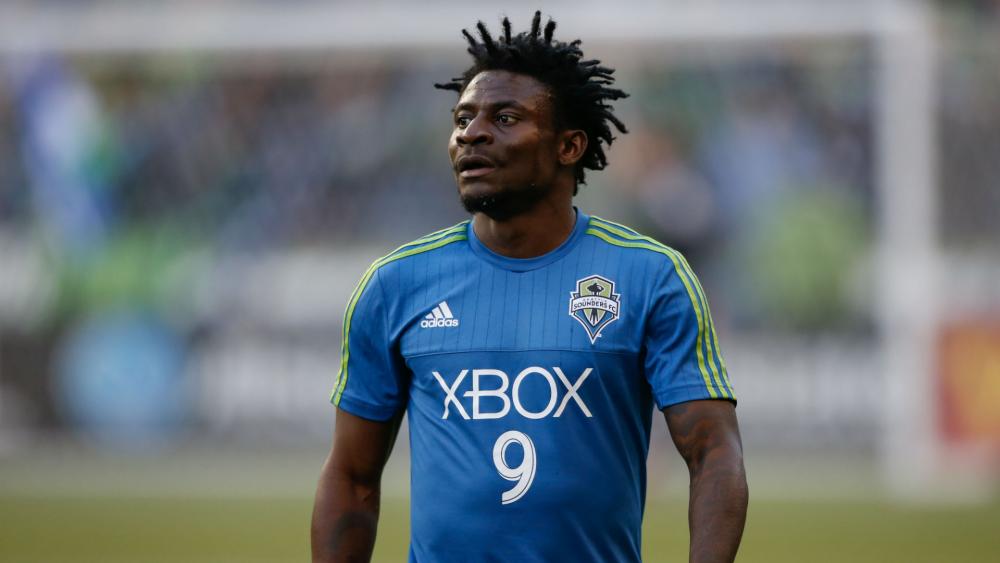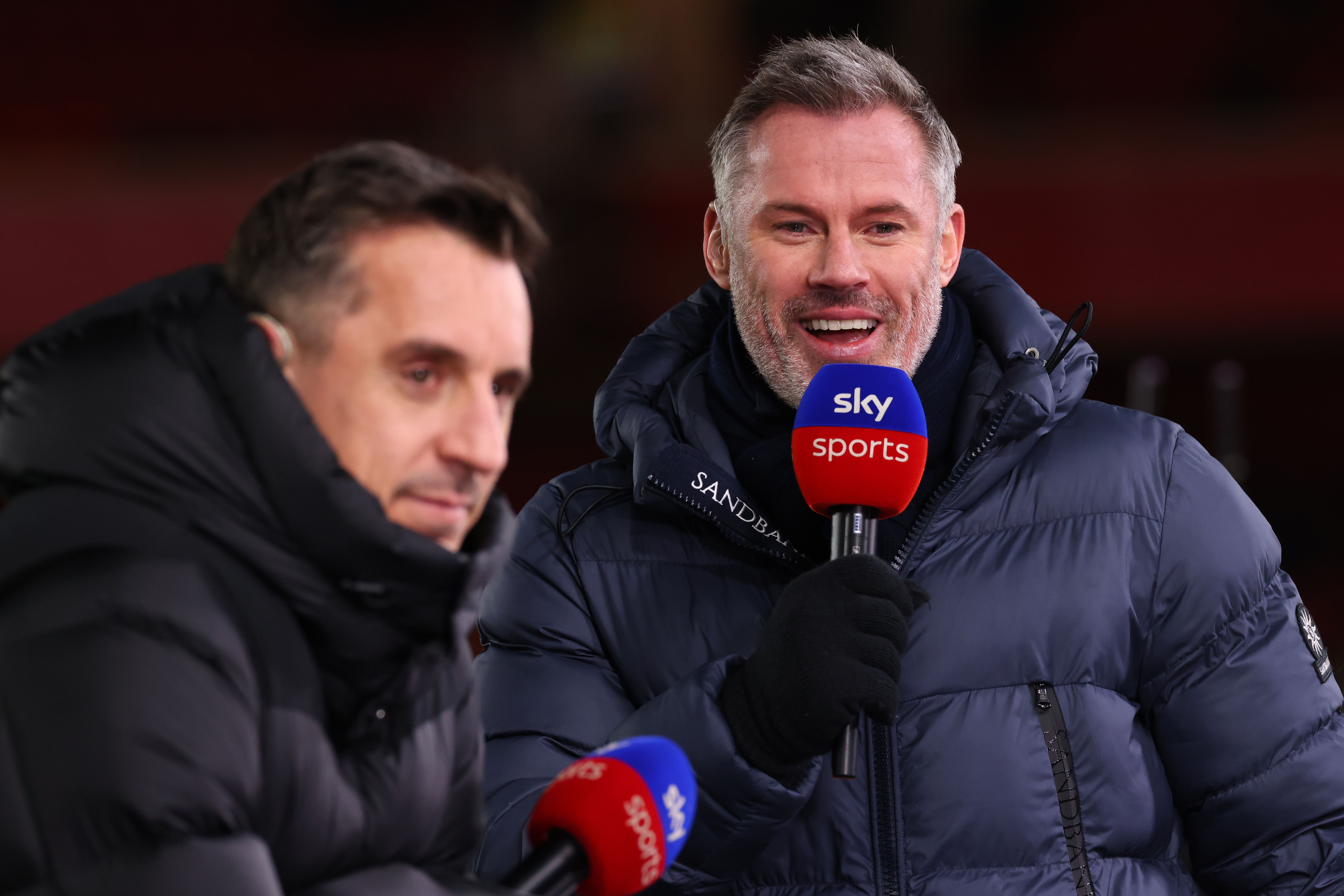What Obafemi Martins leaving means for Seattle and MLS
Star forward Obafemi Martins has left MLS for the big-spending Chinese league. The move will hurt the Seattle Sounders in 2016, but don't look for it to mean much more.

Obafemi Martins leaving Major League Soccer for the riches of the Chinese Super League may set off alarm bells in the minds of some fans, but it shouldn't. Don Garber isn't working the emergency phone calling up MLS owners to start throwing around large sums of money in order to keep up with the big spenders from the Far East. Nor are the stars of MLS lining up at the airport for a voyage to join the likes of Jackson Martinez and Ezequiel Lavezzi in the land of exorbitant transfer fees and contracts that suddenly make MLS designated player deals look like rookie contracts.
No, there is no reason to panic over one star player's decision to take a big paycheck and play in a new league — not when said player has made a career of leapfrogging across the globe in search of adventure and big checks. Martins was never going to retire a Seattle Sounder, and nobody should be surprised he left the minute someone with a deeper wallet came calling.
That isn't to say Martins won't be missed. He was the best player on one of the most exciting teams in MLS, and he figured to be a centerpiece of a Sounders team that had the quality to be a title favorite, and potentially even make a serious run in the CONCACAF Champions League. The Sounders are still one of the best teams in MLS even without Martins, but the club's hunt for trophies has been made much tougher by Martins' departure.
Does China's successful luring of a top MLS star mean MLS is about to see the pipeline of top talent from Europe dry up? Don't bet on it. As much as the Chinese Super League is spending, ask yourself: How many of those signings would have been targets of MLS teams these days? Not Martinez or Lavezzi, or Ramires. You could definitely make the argument for Fredy Montero, but the former Sounder was already riding a much different economic level than he left MLS on.
None of the big signings the Chinese league bagged this winter from Europe was a player anyone would have pegged for a looming future in MLS. That is probably why the Martins signing feels problematic, like the first sign of a greater threat. The reality is there will always be star players at the top end of the talent spectrum who will be drawn to the appeal of living in the United States and Canada's big cities, just as there will always be players who can be swayed by exorbitant salaries and the challenge of joining a budding league like China, in the early stages of trying to gain respectability.
China's big spending would have been a much bigger threat a decade ago, when MLS was still finding its footing, and before it was at a level where foreign players knew they could still play here and maintain their national team standing. MLS is stronger than ever, and also gaining more global attention than ever, thanks in part by increased international television deals built around the most recent generation of stars to reach the league. Players like Frank Lampard, Steven Gerrard, Andrea Pirlo and Kaka have helped MLS increase its profile with TV deals in Europe and South America
The interesting thing about the timing of China's big-money push is that it is coming just as MLS is looking to emphasize helping its teams sign better mid-level talent. The creating of targeted allocation money, which is earmarked specifically to help teams add more players just below the designated player range, should help MLS teams build deeper rosters, and lineups that feature more players who are at a level that can compete with more leagues.
Get FourFourTwo Newsletter
The best features, fun and footballing quizzes, straight to your inbox every week.
Where the Chinese Super League's rapid increased spending should keep MLS concerned is in what ultimately grows from the very expensive seeds being planted in China. If the CSL really captures the imagination of the Chinese population, and the league starts to grow to a point where its recent spending levels will actually be a part of a thriving business rather than just a very expensive gamble, then MLS will need to start taking the Chinese threat seriously.
No, MLS isn't about to start throwing around $25 million transfer fees. But if MLS as a league ramps up its spending a notch or two in a preemptive move to stay ahead of this threat, then that might actually wind up benefiting MLS, which could still stand to spend a bit more.
Martins' departure does mean a lot to the Sounders, who now have to cope with losing their best player. He won't be easy to replace, but the Sounders have the resources and cache to attract a viable replacement.
Here is a closer look at what else the Martins transfer should for Seattle:
IT IS CLINT DEMPSEY'S TIME TO LEAD
Since he arrived in Seattle, Clint Dempsey has had Martins as his partner in goal-scoring crime, and the two played some of the best soccer in MLS together. Martins' presence kept Dempsey from really having to carry the Sounders. Now, with Martins gone, Dempsey will be needed more than ever to be an elite-level threat capable of lifting an offense when it needs him to.
Dempsey has never really been a "main man in the spotlight" kind of guy, but he has carried an attack before. He scored 17 English Premier League goals for Fulham in 2011-2012, and was among the league's best attackers that season. He has also delivered goals in MLS play, but will now have to do so without Martins around.
Dempsey won't be alone. Nelson Valdez is a capable strike partner and youngster Jordan Morris is a very promising talent — which leads us to the next thing Martins' departure should lead to.
THE SOUNDERS NEED A PLAYMAKER
Seattle already has the forwards to field a dangerous attack, but there is a glaring need for an attacking midfielder to pull the strings. As much as some may have been hoping to see Dempsey eventually evolve into that type of role, Seattle has a great chance now to use its available designated player slot to find a playmaker capable of making the most of the weapons already in place.
When you consider what some other teams in the league have been able to do in terms of finding effective playmakers, from Portland's Diego Valeri to Montreal's Ignacio Piatti and FC Dallas' Mauro Diaz, to name a few, the Sounders should be focusing their attention on acquiring such a player.
JORDAN MORRIS MUST HIT THE GROUND RUNNING
He may only be 21 years old, and the Sounders may have wanted to ease him in, but Morris has no choice now but to jump in feet first and play a major role with the Sounders from the start.
It might sound like too much, too soon, especially since we haven't seen him play with the pros yet. That may be true, but Morris has played enough matches with the U.S. national team by now to offer an idea of just how good he can be as a pro. His speed is top notch, and he has shown clear growth from a technical standpoint over the past year. His understanding of the game has also developed.
No, the Sounders aren't going to need Morris to be an All-Star from day one. But anyone who was worried about whether Morris would find enough playing time as a rookie should instead be wondering just how good Morris will be now that he'll likely be a starter from day one.
